Guest post contributed by Warren Fisher of Manole Capital Management, LLC. The other parts of the survey are available here: Part 1, Part 2, Part 3.
In January and February of 2018, Manole Capital conducted a financial services survey specifically targeting the thoughts and opinions of millennials. Over 175 individuals participated, with nearly 90% under the age of 24 years old. 65% were between the age of 19 and 24 and 23% were 18 or younger. In terms of demographics, 84% were from the United States and 12% were from Europe. For additional information about our survey audience, please contact Manole Capital directly.
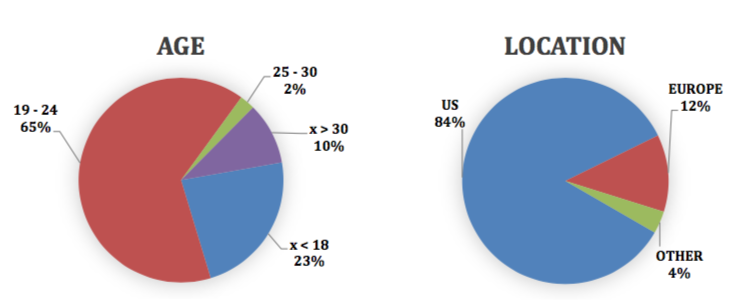
Series #1: Brokerage
In the US, there are a number of retail brokerages that have excellent brand recognition. For example, privately-held Fidelity and publically-held firms like Charles Schwab (ticker SCHW), TD Ameritrade (AMTD), Interactive Brokers (IBKR) and E*Trade (ETFC) led the way. For those clients seeking financial assistance, companies like Bank of America’s (BAC) Merrill Lynch or Morgan Stanley lead the pack.
Investing, especially in the stock market, is not typically something younger individuals do. In fact, there is a looming problem for students that tend to graduate with are large debt burdens from school loans and credit cards.
Account Status
Our first question simply wanted to understand if millennials were opening up traditional brokerage accounts. The clear answer was a resounding “no”! 83% of our surveyed group are not yet bothering to open up a brokerage account right now.
For those that did, only 17%, we then wanted to understand where and whom they were beginning their investing relationship with. With our FinTech portfolio having a large exposure to the online brokerage industry, this was important to understand.
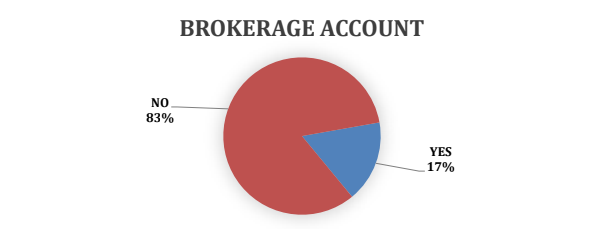
Market Share
Of the modest 17% of millennials in our survey with brokerage accounts, we wanted to understand who they were choosing to do business with. The leader, with 38% market share was E*Trade, followed by Robinhood at 28%, Fidelity at 21% and TD Ameritrade at 17%. Morgan Stanley received 7% and 3% each went to Charles Schwab, Interactive Brokers, ING, Wells Fargo and Merrill Edge.
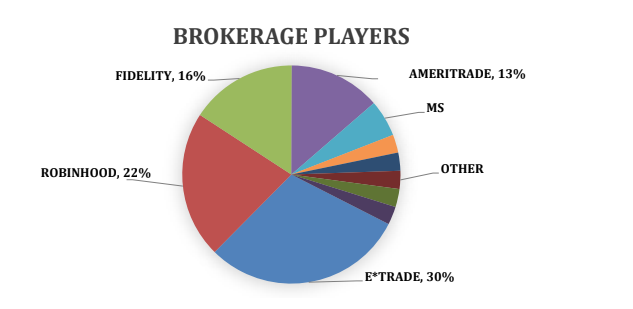
Rationale
For us, there are two key takeaways from these responses. First, advertising and marketing clearly still matter. We believe the 30% share that E*Trade has garnered is a direct reflection of their advertising campaign. The platform, services and pricing are not terribly differentiated, so marketing has to be the answer for them.
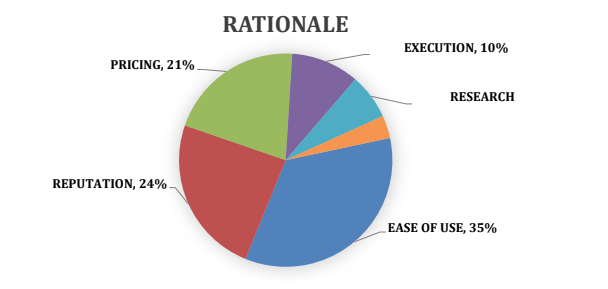
New Entrants
Robinhood, founded in 2013, was the 2nd leading share for our millennials. For those that are unaware of Robinhood, it is a private-held brokerage company, that offers free trading to its customers. It has an impressive list of venture capitalists as investors, including Ribbit Capital, Google Ventures and Andreesen Horowitz. These entitites, for the time being, are OK with funding Robinhood’s current losses. Robinhood let’s young investors learn to invest for free. Instead of paying typical $5 or $10 fees, it offers “free commission trading.” This interesting pricing dynamic is something the market continues to wrestle with.
Pricing
In 2017, Charles Schwab started a pricing war and lowered its commission to roughly $5 per trade. Fidelity, TD Ameritrade and E*Trade all followed suit with lower commissions. The market continues to wonder if we are going to continue to see trading costs head lower, but for the time being, they are stable. The established players believe they are offering wonderful education tools, better price execution and a combination of online access and physical branch locations. For $5 a trade, these companies believe they present a positive value proposition.
On the flip side, many analysts worry that pricing is going to $0 (just like Robinhood). In our opinion, the investor gets what he or she pays for. Not all companies are providing best execution services, so a “free trade” might be quite costly if execution is poor. All of these companies earn fees on cash balances, stock lending and margin, so if commissions are truly zero, they are still able to make revenue and profits.
Clearly, millennials are a solid base of new accounts for Robinhood to attract and bring on. Time will tell if these become long- term clients or they are simply trying out a “free” service.
Bitcoin
We started our cryptocurrency survey with a simple question. Do you think bitcoin is a currency? 63% of our respondents said “no”. We were surprised by this and expected this younger generation to be bitcoin believers and answer a resounding “yes”. Also, surprising to us, is that only 12% of our millennial survey actually have a cryptocurrency account. This was much lower than we expected.
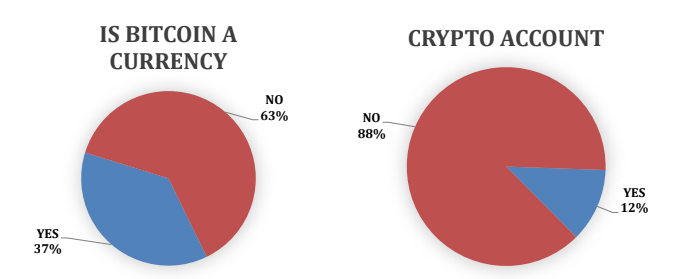
We believe another aspect of Robinhood’s success, in our survey, is their decision to embrace bitcoin trading. While other brokerages are allowing investors to buy or sell bitcoin options or futures, through the CME or CBOE exchanges, Robinhood is acting as a bitcoin exchange.
Established brokers, that handle stock, options and futures trading, are required to follow a variety of federal standards and stringent regulations. Cryptocurrency exchanges are not subject to the same regulated environment and this has resulted in significant risks. While an exchange matches buyers and sellers for a small fee, cryptocurrency marketplaces also safeguard these virtual tokens. As interest grows, hackers are specifically targeting these digital wallets. Cyberattacks on cryptocurrency platforms are skyrocketing, with the recent Coincheck (in Japan) loss equaling $534 million. Since 2014, hacking losses are equal to $1.4 billion. If Fidelity or Schwab were to be hacked, clients would expect to be re-imbursed, as would a bank client in the event of a robbery. The very nature of cryptocurrencies, with their peer-to-peer transactions, prevents an exchange from reimbursing the clients they are attempting to protect.
Crypto Accounts
We asked our survey to tell us if they opened a brokerage account prior to opening a cryptocurrency account. Roughly 1/3rd or 35% of millennials opened a brokerage account first and then proceeded to open a cryptocurrency account, however, 65% of our surveyed millennials chose to begin their “investing” life by opening a cryptocurrency account first. It seems that millennials prefer to trade bitcoin, rather than take the more traditional path of stock market investing. This clearly departs from our thinking and the way prior generations began to invest. Then again…bitcoin did not exist over a decade ago.
Brokerage / Bitcoin Conclusions
Millennials do not seem to be embracing traditional brokerage accounts or traditional methods of investing. Most are not opening up brokerage accounts, YET. For those that do, marketing and additional services (like bitcoin trading and wallets) seem to be important.
On bitcoin, we were surprised on several fronts. First, we were shocked that only 37% of surveyed millennials believed that bitcoin was a currency. Mistakenly, we felt that millennials would be closer to the 75% range. Secondly, we were expecting more millennials to have cryptocurrency accounts. We felt that much of the frenzy and heightened interest in bitcoin late last year was driven by younger “investors”. With only 12% of millennials having a crypto account, the wild move higher might have been fueled by other retail participants and different market participants.
In fact, we wrote a detailed not discussing why we did not view bitcoin as a currency, nor did we believe it was a store of value or valid payment mechanism. To read this note, click here or visit our website at www.manolecapital.com, and go to the “Research” tab.
Disclaimer:
Firm: Manole Capital Management LLC is a registered investment adviser. The firm is defined to include all accounts managed by Manole Capital Management LLC. In general: This disclaimer applies to this document and the verbal or written comments of any person representing it. The information presented is available for client or potential client use only. This summary, which has been furnished on a confidential basis to the recipient, does not constitute an offer of any securities or investment advisory services, which may be made only by means of a private placement memorandum or similar materials which contain a description of material terms and risks. This summary is intended exclusively for the use of the person it has been delivered to by Warren Fisher and it is not to be reproduced or redistributed to any other person without the prior consent of Warren Fisher. Past Performance: Past performance generally is not, and should not be construed as, an indication of future results. The information provided should not be relied upon as the basis for making any investment decisions or for selecting The Firm. Past portfolio characteristics are not necessarily indicative of future portfolio characteristics and can be changed. Past strategy allocations are not necessarily indicative of future allocations. Strategy allocations are based on the capital used for the strategy mentioned. This document may contain forward-looking statements and projections that are based on current beliefs and assumptions and on information currently available. Risk of Loss: An investment involves a high degree of risk, including the possibility of a total loss thereof. Any investment or strategy managed by The Firm is speculative in nature and there can be no assurance that the investment objective(s) will be achieved. Investors must be prepared to bear the risk of a total loss of their investment. Distribution: Manole Capital expressly prohibits any reproduction, in hard copy, electronic or any other form, or any re-distribution of this presentation to any third party without the prior written consent of Manole. This presentation is not intended for distribution to, or use by, any person or entity in any jurisdiction or country where such distribution or use is contrary to local law or regulation. Additional information: Prospective investors are urged to carefully read the applicable memorandums in its entirety. All information is believed to be reasonable, but involve risks, uncertainties and assumptions and prospective investors may not put undue reliance on any of these statements. Information provided herein is presented as of December 2015 (unless otherwise noted) and is derived from sources Warren Fisher considers reliable, but it cannot guarantee its complete accuracy. Any information may be changed or updated without notice to the recipient. Tax, legal or accounting advice: This presentation is not intended to provide, and should not be relied upon for, accounting, legal or tax advice or investment recommendations. Any statements of the US federal tax consequences contained in this presentation were not intended to be used and cannot be used to avoid penalties under the US Internal Revenue Code or to promote, market or recommend to another party any tax related matters addressed herein.


Leave a Reply